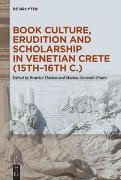En savoir plus
This collection of essays aims at showing Crete as a cultural centre that bridges two close and, at the same time, distant worlds and traditions, Byzantium and Western Europe (Venice), during a pivotal "Renaissance" period for the island, between the 15th and 16th c. The book tells an unprecedented story about people producing, reading, cherishing, and collecting books in Crete, and about their connections across time and space. The volume showcases the viewpoint of nine scholars, whose observations set a wide stage for reflections on places, people, cultural propaganda, and power in Venetian Crete. With their skill to weave narratives into broader conversations and complex socio-cultural commentaries, they offer the academic readership as well as the wider audience opportunities to learn, reflect upon and re-think the rich cultural heritage of the island, through the lens of the materiality and immateriality of books. To this end, the book features investigations into the craft of manuscripts in Crete and the creation of book collections by notable figures. It also contains prosopographical studies on copyists, their migration patterns from Constantinople to Crete, and from there to Italy and vice-versa as well as research into the characteristic antiquarianism of 16th c. Venetian scholars and the revival of ancient genres in learned poetry, while looking at peculiar aspects of the culture of Cretan humanists of the time.
A propos de l'auteur
Beatrice Daskas, Ca’ Foscari University, Venice, Italy; Marina Detoraki, University of Crete, Rethymnon, Greece.
Résumé
This collection of essays aims at showing Crete as a cultural centre that bridges two close and, at the same time, distant worlds and traditions, Byzantium and Western Europe (Venice), during a pivotal “Renaissance” period for the island, between the 15th and 16th c. The book tells an unprecedented story about people producing, reading, cherishing, and collecting books in Crete, and about their connections across time and space. The volume showcases the viewpoint of nine scholars, whose observations set a wide stage for reflections on places, people, cultural propaganda, and power in Venetian Crete. With their skill to weave narratives into broader conversations and complex socio-cultural commentaries, they offer the academic readership as well as the wider audience opportunities to learn, reflect upon and re-think the rich cultural heritage of the island, through the lens of the materiality and immateriality of books. To this end, the book features investigations into the craft of manuscripts in Crete and the creation of book collections by notable figures. It also contains prosopographical studies on copyists, their migration patterns from Constantinople to Crete, and from there to Italy and vice-versa as well as research into the characteristic antiquarianism of 16th c. Venetian scholars and the revival of ancient genres in learned poetry, while looking at peculiar aspects of the culture of Cretan humanists of the time.

